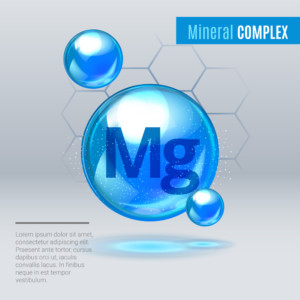Magnesium, What It Does for the Body
 Why does the body need magnesium?
Why does the body need magnesium?
In order to function correctly and efficiently your body needs many nutrients. Magnesium is a key ingredient.
Over three hundred biochemical and bioelectric reactions depend on magnesium to occur. Magnesium is necessary for functioning of enzymes, the health of heart arteries, protein production & nerve function.
Magnesium is necessary for the correct assimilation of calcium and potassium. All the major minerals (calcium, potassium & sodium) are dependent on magnesium being present in order to function.
Magnesium is needed for bone strength, muscle strength as well as the functioning of the nervous system.
Magnesium is intimately involved in over 600 reactions in the body including the metabolism of food, the transmission of nerve impulses, the synthesis of fatty acids and proteins, muscle movements, gene maintenance and protein formation.
What does a deficiency of magnesium cause?
Your body will be performing with less than full capacity with a deficiency. These processes will not occur very efficiently, or may not happen at all.
The principal function of magnesium is that it enables muscles to relax. With inadequate magnesium, the muscles will cramp. When this happens to the heart muscles the heart does not go through a complete relaxation phase, and the next calcium-driven contraction begins before the relaxation is complete. This results in rapid heart beat and irregular heart rate known as arrhythmia. Heart failure resulting from fibrillation and lesions in the small arteries is linked to this deficiency of magnesium.
Magnesium deficiency is thought to be closely related to coronary heart disease, including myocardial necrosis. An inadequate supply of this mineral may result in the formation of clots in the heart and brain and may contribute to calcium deposits in the kidneys blood vessels, and heart.
Symptoms of Deficiency
Symptoms of a deficiency may include:
- gastrointestinal disorders
- irregular heart rhythm
- lack of coordination
- muscle twitch
- tremors
- weakness
- apprehensiveness
- personality changes
- disorientation
- confusion
- depression
- irritability
- migraines
- PMS
A deficiency interferes with nerve and muscle impulses. Long-term deficiency can lead to:
- a calcium deficiency
- alcoholic hallucinations
- unusual face and eye movement
- alopecia (baldness)
- swollen gums, and lesions of the gums
- The symptoms of magnesium deficiency are identical with many of the symptoms of thyroid disease, especially hyperthyroidism.
A slight deficiency and you will notice slight depression and lack of well-being.
When there is more of a deficiency, you can start getting
- headaches
- pain in the lower back
- stiff tight muscles, particularly in the back. It can then progress to muscle cramps
- calcium deposits
- muscle twitches and tics
- high blood pressure.
- You can start to get nervous, feel like you’re getting old have trouble sleeping and wake up feeling tired.
Your body can
- go into spasms
- involuntary and abnormal muscular contractions and jerks.
- It can progress to chest pain, called angina pectoris.
- Your heart can start racing and can go out of rhythm.
- There are studies that show that fibromyalgia is associated with magnesium deficiency.
All because of a deficiency of magnesium? The body cannot function unless it has sufficient amounts of this mineral.
Magnesium and Calcium
Calcium, a major mineral, needs magnesium in order to assimilate into the body.
Calcium, however, should never be taken on its own. Otherwise, it will pull magnesium out of body parts in order to assimilate. This creates a greater magnesium deficiency and the person will feel worse. This can occur with people who drink a lot of milk. Milk is about 8 calcium to 1 magnesium and it will create a magnesium deficiency.
Since magnesium regulates the entrance and utilization of calcium in the cells, without magnesium, calcium remains in the body unused. This will result in calcium deposits in the joints (often called arthritis), gallstones, kidney stones, hardening of the arteries, and in extreme cases calcification of the brain and other body organs and parts. This, in turn, can result in loss of memory and loss of ability to reason. All of these conditions have frequently been known to disappear after taking extra magnesium,
Excess calcium combined with low magnesium will create osteoporosis and fragile bones.
From this you can deduce that it is contra survival to take calcium without magnesium. The rule is “Never take calcium without magnesium. Calcium depends on magnesium for it to assimilate. Magnesium, on the other hand, doesn’t require calcium in order to function.
Excess calcium can become a real problem. Excess magnesium, on the other hand, is impossible.
A lot of people get calcium from their diet.
What Depletes Magnesium from the body?
Modern stresses, whether chemical, environmental, physical or mental, frequently deplete magnesium reserves (which are often depleted faster than calcium reserves). This can cause a magnesium deficiency and the resultant symptoms of internal stress, even when the person does take magnesium supplements if he takes more calcium than magnesium (which is very common). Extra magnesium can often mean the difference between a stressed body and a completely relaxed one.
Things that deplete the body of magnesium: These items dramatically speed up the depletion of your body’s magnesium storage, and make it necessary for much more magnesium to be consumed:
- Mental stress
- Physical stress
- Coffee
- Sugar
- High sodium diet
- Alcohol
- Cola-type sodas
- Tobacco
- High perspiration
- Medical drugs of all types, especially diuretics, digitalis
- Low thyroid
- Diabetes
- Chronic pain
- A high carbohydrate diet
- A low carbohydrate diet
- A high calcium diet.
- A low calorie diet
- Because of the competing nature of calcium and magnesium, excessive calcium intake from foods or supplements can lead to a magnesium deficiency.
- Disease such as pancreatitis, arteriosclerosis, kidney malfunction.
- Malabsorption problems caused by chronic diarrhea or vomiting.
- Fluoride
- High zinc levels
According to the Nutrition Almanac, “Magnesium deficiency can easily occur because magnesium is refined out of many foods during processing. Cooking food removes the minerals; the oxalic acid in foods like spinach and phytic acid found in cereals bind magnesium in the body, as do unbalanced amounts of salts.”
Beneficial Effects of Magnesium
Magnesium is vital in helping prevent heart attacks….After a heart attack, it has been found that supplementation provided a much higher survival rate and showed far less life-threatening dysrhythmias.
It has also proved beneficial in the treatment of neuromuscular disorders, nervousness, tantrums, depression, sensitivity to noise, and hand tremor.
Supplementing helps control dizziness, muscle weakness, twitching, heart disease, and high blood pressure.
Magnesium reduces blood cholesterol and keeps the arteries healthy. It is used for controlling convulsions in pregnant women, premature labor, and epileptic seizures.
Magnesium must be combined with other minerals to be most effective in helping support healthy blood pressure levels. It is essential for cells to maintain proper balances of other minerals such as potassium, sodium, and calcium. When cells are deficient in magnesium, this balance is disrupted.
Chocolate is a good source of magnesium and has a high magnesium to calcium ratio (about 4:1). When Magnesium is low the craving for chocolate may be due to a need for magnesium. There are other foods such as brown rice, avocados, spinach, haddock, oatmeal, navy beans, lima beans, broccoli, yogurt, bananas, baked potatoes, apples, apricots, brewer’s yeast
Want to Supplement?
RECOMMENDED:
Not all Magnesium supplements are the same. Supplements vary in quality and bioavailability. MCVitamins researches to find out which supplements do what they say they will do. The facts you have leaned don’t need to be checked, you need a formula that works.

We found an excellent supplement by Berg Nutritionals (an excellent company)
Why do we recommend it? Read about this Magnesium.
STILL HAVE QUESTIONS? CALL EMAIL AND GET YOUR QUESTIONS ANSWERED.
Sign up to receive the MCVitamins Newsletter!
Up-to-date info on the latest health-related news happening in the world
(available in English only)

